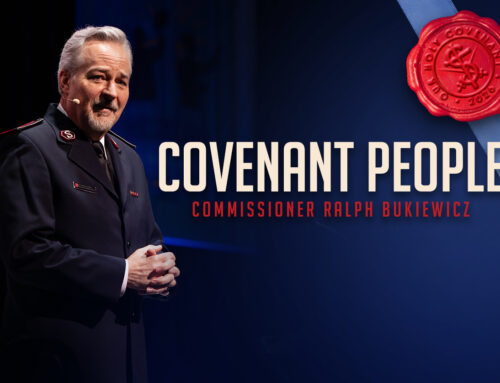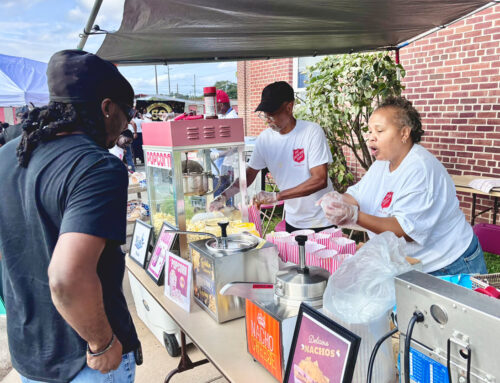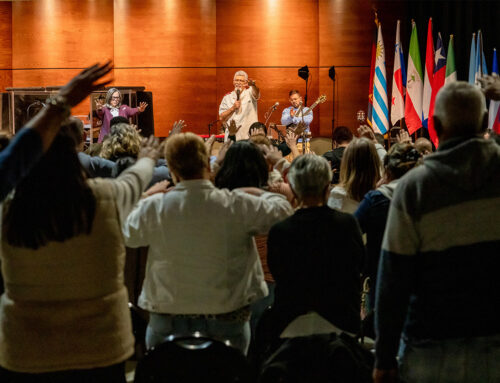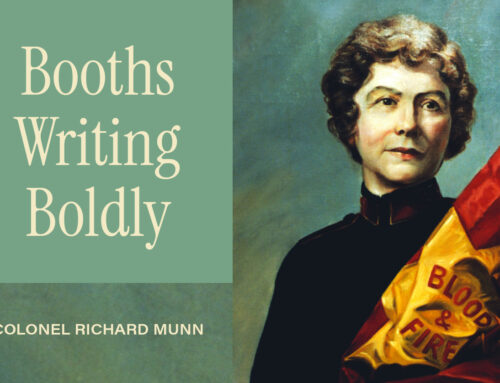Unity in the Community
by Robert Mitchell
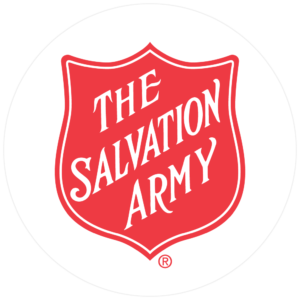
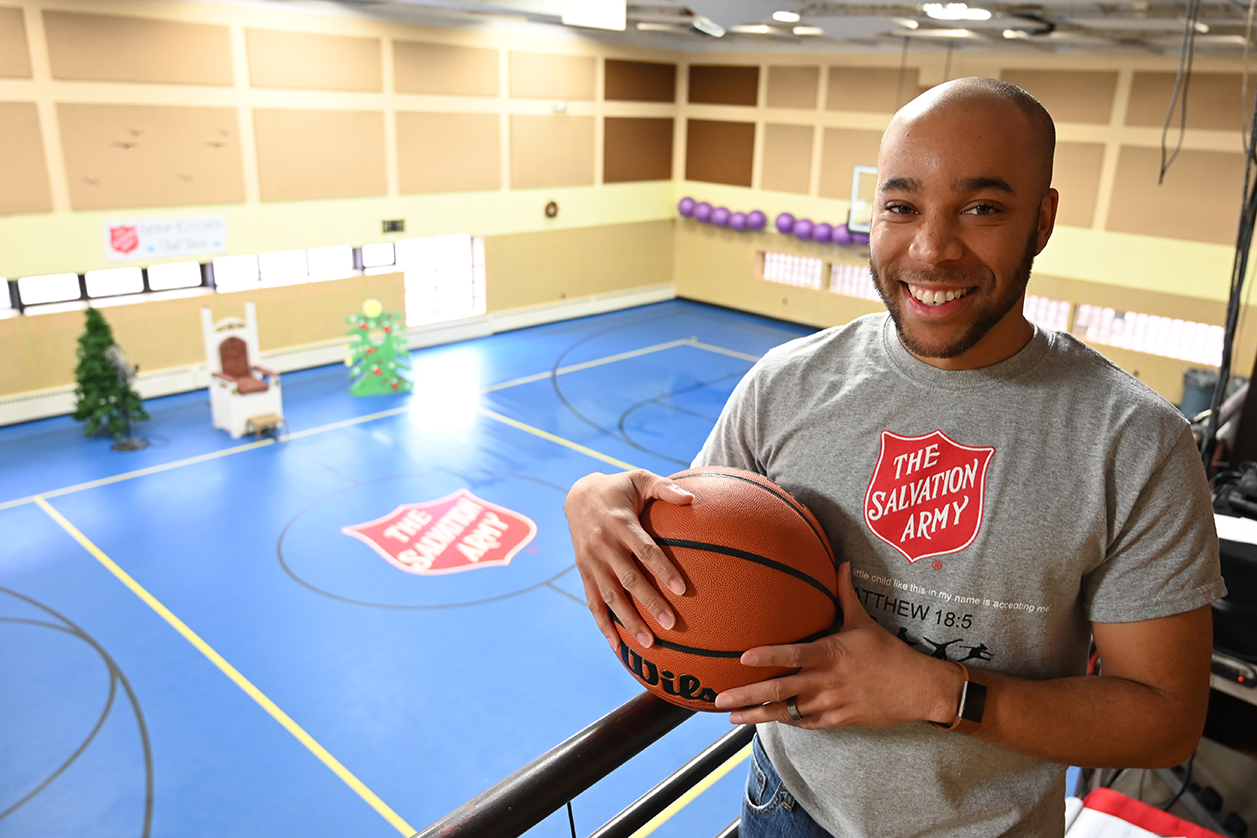
Philadelphia is known as the “City of Brotherly Love,” but the homicide rate there in recent years tells a very different story. The Salvation Army hopes to reopen a long-shuttered community center soon that could make a huge difference in troubled North Philadelphia.
In the early days of 2022, gun violence and murders continued to plague parts of the city after a record 559 homicides in 2021—the most since 1960. Three months into the new year, the murder rate was running slightly ahead of 2021, according to an online tracker. Several community groups, including The Salvation Army’s Philadelphia Temple in North Philly, have joined forces to try and address the violence.
“We’re actually trying to reopen our community center, which has been closed for 20 years,” says Lieutenant Chris Brown. “The community center had been kind of a safe haven for the people in the nearby Richard Allen projects for many years before it closed.”
Brown and his wife, Lieutenant Tara Brown, would seem the perfect fit to reopen the center. Before becoming Salvation Army officers, they attended the Canton, Ohio, Citadel Corps and helped open a center there; Brown was the community center director.
“When we first got to Philadelphia last July and went around the community getting to know people, everybody always talked about how much they loved the community center, particularly people who were close to our age, like around 40 or in their 40s,” Brown said. “They kind of grew up at the center.”
The Browns did some research and found that 90 percent of the recreation and community centers in Philadelphia have closed in the past two years.
“That gives kids no place to be,” Brown said. “There’s no safe environment. Even the Richard Allen projects are dangerous.”
A DIVINE MEETING
Brown also met Michael Muhammad, a community activist and block captain who connected him to the Black Male Community Council of Philadelphia. The group invited The Salvation Army to be part of a community day last month called “Unity in the Community” in North Philly. Some of the events were held at the Philadelphia Temple and included music, African dance and drums, and breakout sessions on conflict resolution, community activism, and violence reduction in the neighborhood.
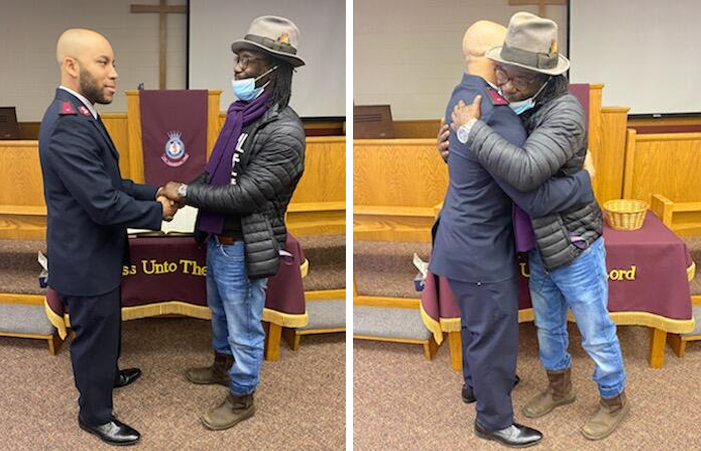 Lieutenant Chris Brown (left) with Michael Muhammad.
Lieutenant Chris Brown (left) with Michael Muhammad.
Lt. Colonel Larry Ashcraft, divisional commander of The Salvation Army’s Eastern Pennsylvania & Delaware Division, wrote, “Throughout the day there were close to 200 people from the community who came through the building. It was great to see the space in our building utilized and to see people and to hear conversations happening throughout the rooms and halls of the building.”
Brown said the Black Male Community Council asked if The Salvation Army could host some of the events and his response was, “Absolutely.”
“What they’ve tried to do is work inside those projects to revitalize the community and help other organizations like The Salvation Army get involved with them and start programs,” Brown said. “So, it was kind of a no-brainer for us to host that. Their intention is to bring programing to the projects and we’re a big part of that. They want to help us kind of get our doors open and get some programs going.”
In fact, the council offered to hold African drums and dance classes at The Salvation Army. Meanwhile, Philadelphia Sheriff Rochelle Bilal offered to send some of her deputies to The Salvation Army’s after-school program. The class would teach police academy basics to students in grades 9-12 and they would go straight into law enforcement after graduation without attending college.
“What did come from the ‘Unity in the Community’ event is we’ll have some programing in our center now because of it,” Brown said.
The programming is desperately needed in the area. Brown said besides a lack of activities for young people, the neighborhood is plagued by a breakdown of families and poverty.
“Family structures are messed up,” he said. “Poverty is through the roof. Gentrification is off the chain. So, almost right across the street from our corps there are high-priced apartments for $2,500 a month for a studio. Then, literally a few hundred meters away from that are the projects. We have people who are poor. What they have been doing in Philadelphia is leveling those projects and putting in super high-priced housing and then people don’t have anywhere to go. It’s a huge problem.”
FINDING A HOME
Brown said he saw some violence in Canton, but the mayhem in North Philly is “on another level.”
“The amount of gun violence is ridiculous,” Brown said, noting that four or five people have been murdered on a corner near The Salvation Army. “A lot of the shooters are younger people, so my goal would be to get them before the streets get them. A lot of these guys don’t have any family and they don’t have any friends and they get into gangs.
“Our goal is to get to them before they get tied up to the streets and just try to give them some alternatives other than the violence in the neighborhood. They really have no alternatives. The kids literally have nothing to do.”
For example, Brown said some young people showed up at the church during “Unity in the Community” and he let them play basketball in the church gym. Some have even come on Sunday mornings to play ball.
“They literally have nowhere to go,” Brown said. “They have nothing to do. I think there’s a YMCA in our neighborhood, but other than that, it’s just us. We get calls about people wanting to rent our gym all the time because there’s nothing.”
With the need so urgent, Brown hopes to reopen the community center “as soon as possible,” probably sometime this year.
“There are some things that we’re kind of doing already,” Brown said. “I’ve been doing open gyms myself once or twice a week when I can. I can’t be there all day and I can’t be there every day.”
Brown said The Salvation Army has applied for grants and hopes to hear something soon. He would like the community center to look something like the one he helped open in Canton.
“If we’re able to get this grant, we’ll be able to hire some staff and then we can open it,” Brown said. “I would like to see a full community center. I want it to be open every evening and have something going on. I want the kids to have something to do. Even if they’re just coming to play board games. They’re safe for an hour. They’re off the streets.
“We have 12-year-old kids who come and some of them have already seen three or four murders in their lifetime. Can you imagine the trauma, just from that? No kid should have to see three or four murders by the age of 12. That’s ridiculous. That’s crazy.”
A LIFE CHANGED
Brown said the “Unity in the Community” event showed everyone that “there are people working together to try to help the community” and the effort is widespread and diverse.
“The Black Male Community Council has Christians in the organization, and they have Muslims in the organization,” he said. “A lot of them are Muslims, but they’re super willing to work with us. We’re willing to work with them because we know the problem is so great. No one is going to do it on their own. There’s no way one person or one organization is going to stop 559 murders in Philadelphia. It’s not going to happen. We must work together.”
Ashcraft agreed, saying, “Let’s open our doors and hearts to our communities. They are waiting to connect with us. There are also tons of people with Salvation Army roots out there. You never know what opening a door to them may do.”
In fact, the “Unity in the Community” event was held in memory of Muhammad, a Muslim who became quick friends with Brown once he arrived in Philly. Muhammad started coming to church at The Salvation Army. Brown believes he became a Christian before his death.
“We had an altar call and he came up and I could see a big-time shift in him,” Brown said of his deceased friend. “We would talk about spiritual things a lot. We talked about Jesus a lot and a few weeks before he died, we got close. He was calling me pretty much every day and he was praying for me instead of me praying for him.
“There were a lot of things about his own faith that he wasn’t sure about. We would also talk about my faith. That kind of led to him picking up a Bible. He would read to me out of the Psalms almost every day. He would call me and pray and then read me a scripture for a couple of minutes.”
One day, he said to Brown, “I’ll see you next week for worship.” But the day before that Sunday arrived, Muhammad was shot and killed in front of his house.
“I believe that he did accept Christ,” said Brown. “He never told me that specifically, but I really believe he did.”
A Bit of History
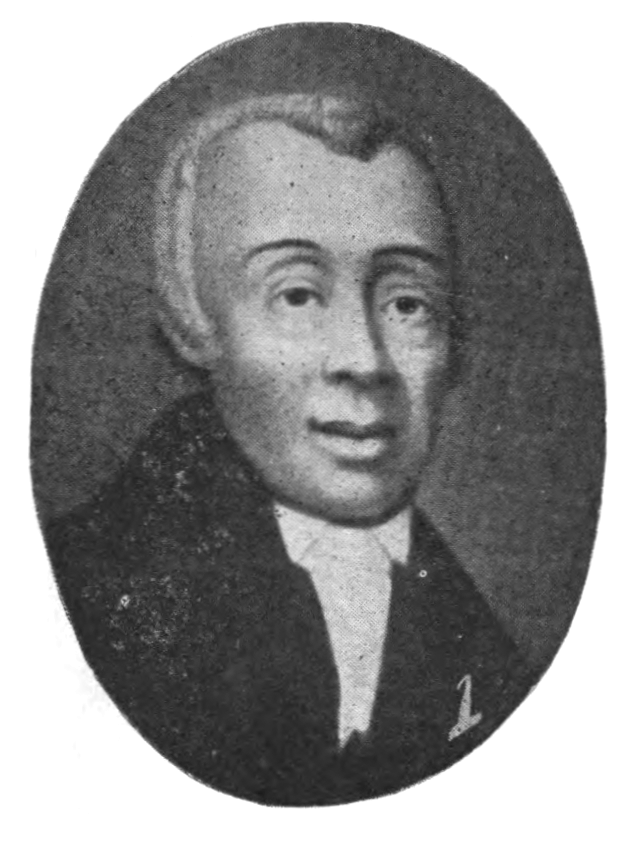
The “Unity in the Community” event was held to benefit Philadelphia’s Richard Allen projects. Who was Richard Allen (1760-1831)? A former slave, Allen was a founder of the African Methodist Episcopal Church (AME), the first independent black denomination in America. He came to Christ upon hearing an itinerant Methodist preacher at a secret meeting of enslaved people. He purchased his freedom in 1780 and went on to become one of the nation’s first civil rights leaders. The Salvation Army grew out of the Methodist movement.

